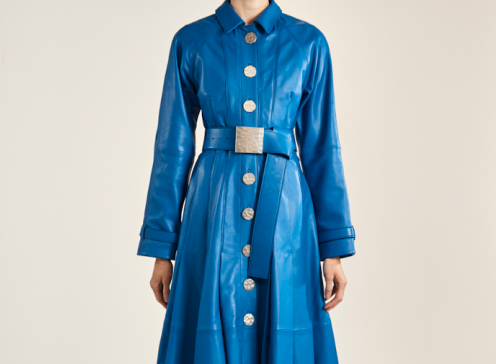To understand the relationship between vegan leather and sustainability, we offer a word: pleather. Until around the turn of the millennium, this combination of plastic and leather was the term used to describe what we’re now likelier to call “faux leather” or “vegan leather.” Those terms for vegan alternatives might sound more appealing, but pleather is the more truthful moniker for what these materials are. More truthful yet would simply be plastic.
Plastic leather, along with its vegan siblings like nylon (a silk replacement) and acrylic (subbing in for wool), is at the heart of a misconception that non-animal fibers and textiles are, by definition, a win for animals and the environment. In truth, many of these textiles are produced using petrochemicals.
To understand the relationship between vegan leather and sustainability, we offer a word: pleather. Until around the turn of the millennium, this combination of plastic and leather was the term used to describe what we’re now likelier to call “faux leather” or “vegan leather.” Those terms for vegan alternatives might sound more appealing, but pleather is the more truthful moniker for what these materials are. More truthful yet would simply be plastic.
Circumventing Vegan Values
Following a vegan lifestyle was once seen as a statement about animal rights. That’s likely still true for many, but growing social chatter around veganism now centers on its environmental benefits. Rightfully so: Red meat can have as much as 100 times the negative environmental impact of plant-based food. More and more people are paying attention without going full vegan—flexitarians and Meatless Monday followers eat vegan part time, often because of its environmental benefits.
For vegans and those just looking to reduce their environmental footprint, the marketplace historically hasn’t given them many great options and at worst has been misleading. Neither of the plastics that constitute the bulk of vegan leather fabric (polyurethane and polyvinyl chloride, or PVC) can lay a claim to sustainability. For starters, they’re both derived from fossil fuels, a nonrenewable resource. Then, to go from raw plastic to a wearable, attractive form, both undergo rigorous chemical treatments. PVCs are hard plastics, so to become soft enough to wear they’re treated with phthalates, a group of chemicals known to disrupt reproduction in humans and wildlife. Polyurethane “leather” requires solvents like dimethylformamide, which has been shown to cause liver damage. Neither material can be recycled; neither biodegrades; both wind up polluting the planet. When we hurt the planet, we make it less safe for humans and animals alike.
Even as PETA refers to plastics as “eco-friendly”, fake leather’s environmental impact isn’t necessarily news to vegans, and some brands are becoming more transparent with regard to their production processes and the environmental impact of the leather alternatives they use.
This rising awareness has also given birth to the search for vegan leather that lives up to its name: plant-based textiles made from materials like pineapple leaves and cork. There has also been a recent spate of bioengineered fibers, which are genetically modified proteins created in a lab to mimic natural materials like leather and silk. We’re hopeful that these new possible alternatives turn out better for the planet all around, but more long-term research is needed. We don’t yet know if some of these bioengineered fibers are biodegradable, we don’t know the results of their biotech waste, and we don’t know what happens when these materials come into contact with the natural world. Plus, as the Council of Fashion Designers of America points out, their raw materials might not be sustainable—if a bioengineered silk-like protein relies upon sugar as its energy source, the environmental impact of farming that sugar counts against its carbon footprint.
A Holistic Approach
At Evolved By Nature, as part of our efforts to reduce the apparel industry’s reliance on unhealthy finishing chemicals, we are creating a range of more sustainable, innovative finishing solutions for leather that can remove a significant amount of polyurethane from the process. This is all possible with our Activated Silk™ technology, natural silk protein that’s been liquified, sourced from cocoons that do not undergo the textile industry’s reeling process. Research indicates that the silk industry (mulberry plants, specifically) helps mitigate its own carbon footprint and it has a tradition of lifting rural families in developing regions out of poverty. We want to protect the planet and we want healthier, more sustainable choices at every consumer touch point. We stay true to that ethos at every step.
